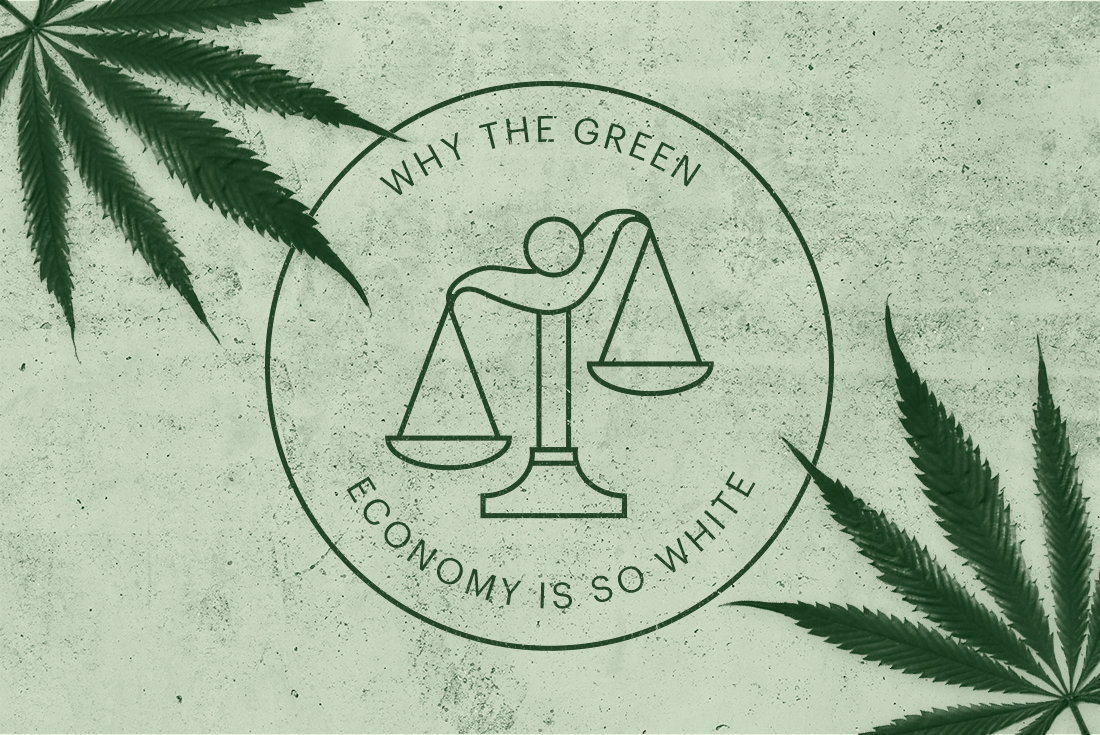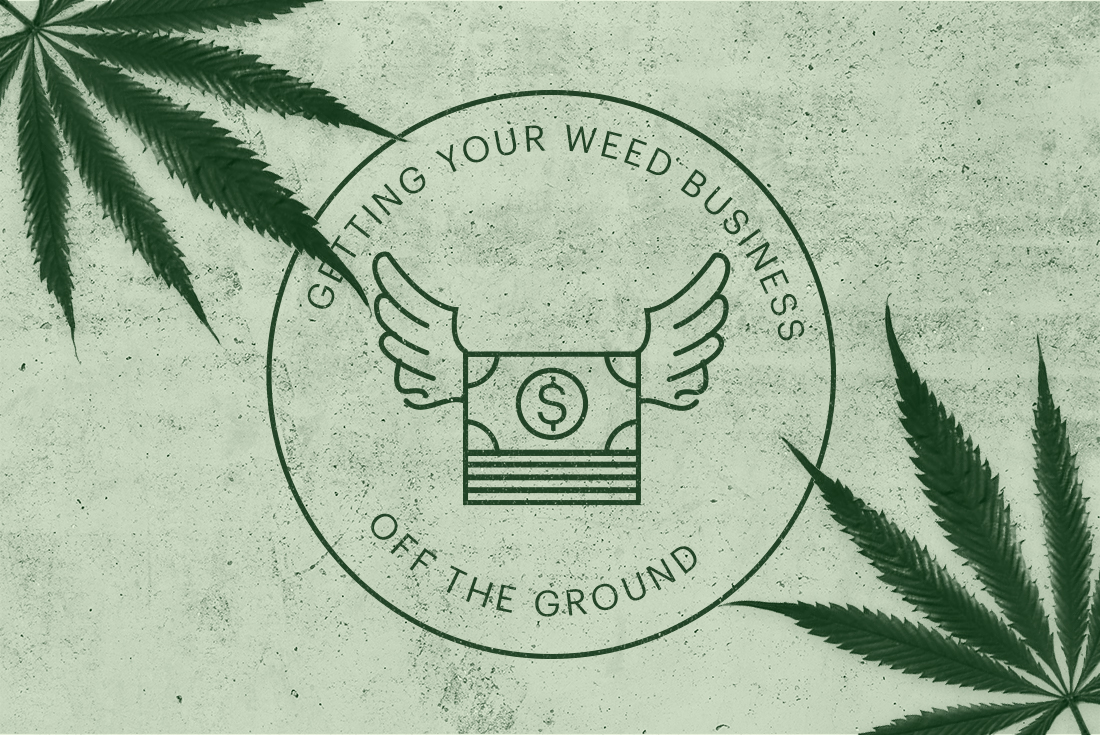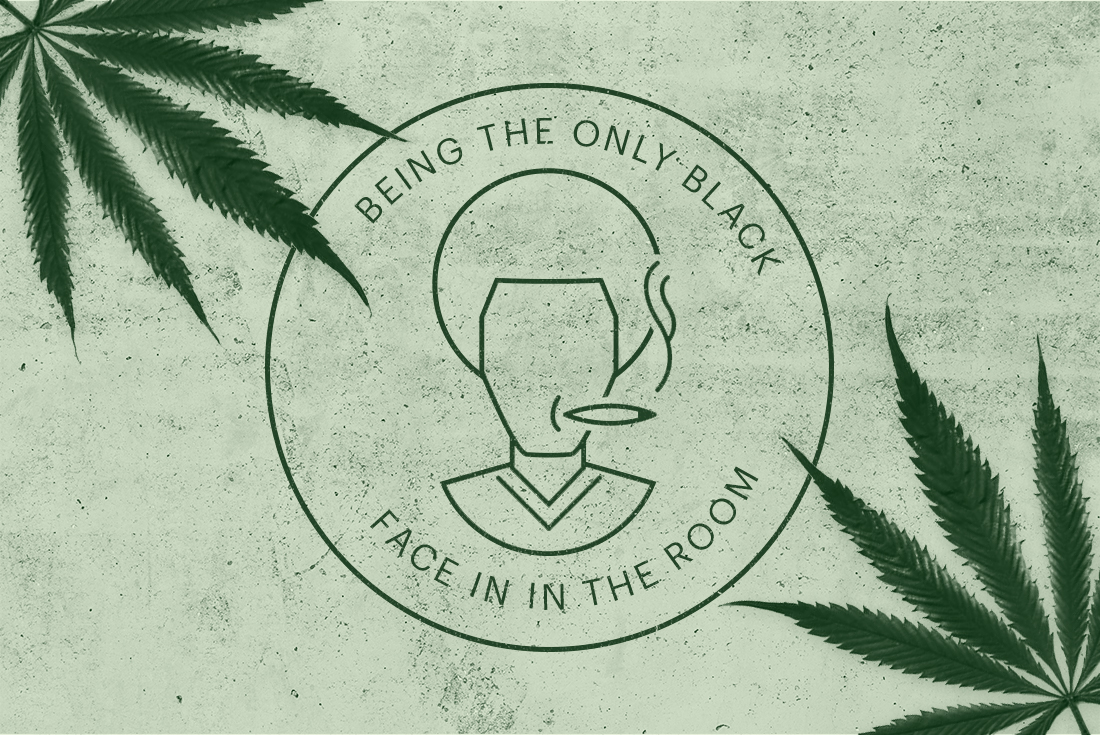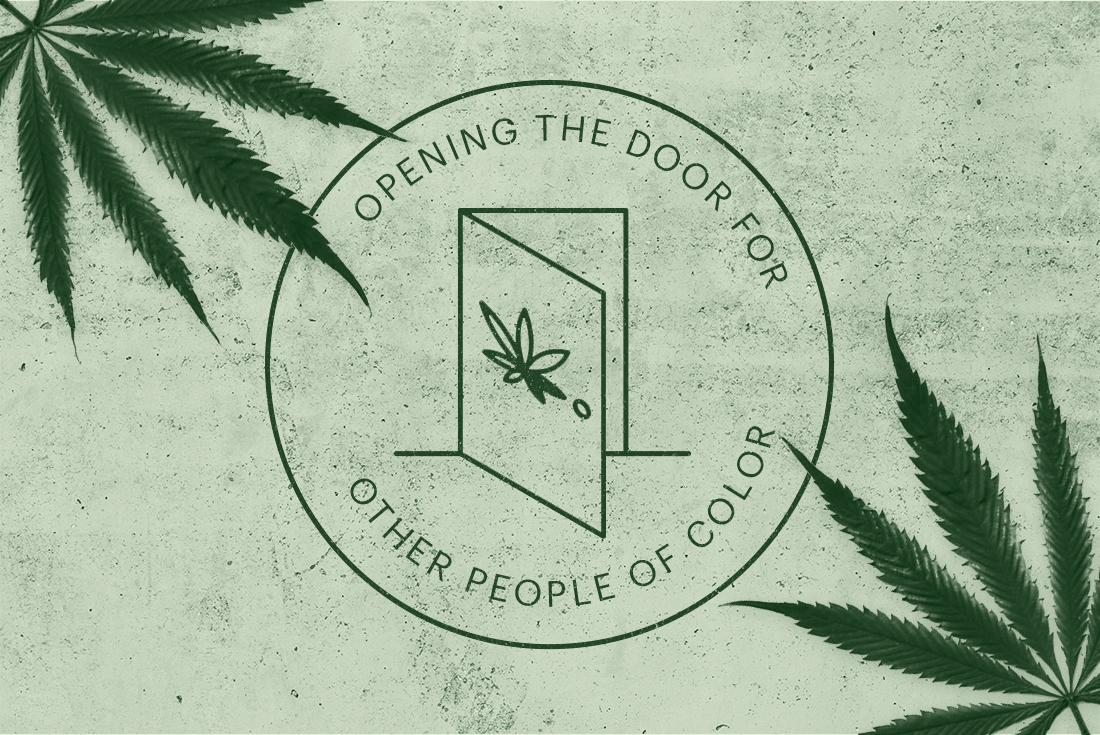Not everyone can be Wiz Khalifa, Snoop Dogg or Freddie Gibbs. We’re not just talking about the money, fame, and musical talent, but the fact that all three are people of color making money in the legal marijuana industry.
With the decriminalization of weed gaining more and more traction—medical marijuana is currently legal in roughly 28 states (and Washington, D.C.), and recreational use is now legal in eight states—there’s been a wave of entrepreneurs sparking up new streams of income in the marijuana business. But it’s mostly whites who are making a profit from this “green rush.” According to an investigative report by Buzzfeed, only 1 percent (fewer than three dozen) of the 3,200 to 3,600 marijuana dispensaries in America are black-owned. Outside of the celebrity-endorsed bud brands, there are just a handful of everyday black folk who have been successful in opening up a cannabis company of their own or attaining leadership positions for existing weed businesses.
Breaking into this emerging market hasn’t proven easy for many black entrepreneurs, who often face financial and racial challenges that their white counterparts don’t. Look at cases like Charlo Greene, the former news anchor whose on-air resignation to focus on her advocacy work with the Alaska Cannabis Club went viral in 2014. Since making the career shift from journalism to izm, Greene reports says she's been unfairly targeted and discriminated against by local law enforcement. Although marijuana use has been approved in Alaska since February 2015, she’s currently facing up to 54 years in prison due to new legislation—often referred to as the Charlo clause—that makes it illegal for anyone who ran a cannabis club prior to Nov. 4, 2015, to participate in the green economy. According to Greene, she’s the only person in the entire state that the law would apply to.
But despite the roadblocks, black weed entrepreneurs still have a shot in the industry. Programs such as the National Minority Business Council and National Cannabis Industry Association are focused on getting more people of color in on the action. Complex spoke with several African-American entrepreneurs in the cannabis business to get an honest look at what it means to be black in the world of weed.
“For the longest time, there were no people that looked like me. I literally felt like I was bearing the weight of my entire race on my shoulders.” —Dr. Lakisha Jenkins
Breaking Into The Green Economy
Willie Green, Social Media/Marketing Specialist at greenRush Cannabis Delivery Service; San Francisco, CA: I started out as a grower. Then I had a eureka moment, that that’s what I was going to do to free me from monetary constraints. The reason I'm here today is because I’ve had a lot of people around me go down for drugs and I've been able to stick and move and stay away from that. Where I’m from [San Francisco] it’s literally nothing else to do.
Dr. Lakisha Jenkins,Natural Health Counselor/Natural Healer and founding board member of theCalifornia Cannabis Industry Association; Merced, CA:My introduction [to marijuana] came early because my family is from Mississippi, and on both my black American side and my Native American side, you learn how to use herbs to affect your own health. There’s a lot of medical and health disparities in that area, especially during the time when my great-grandparents and my grandparents were coming up, so traditional medicine is what they still use to this day. My grandfather would always make herbal concoctions for our family and neighbors to help combat the symptoms of whatever illnesses they were experiencing.

Why The Green Economy Is So White
Khadijah Adams,CEO of cannabis consulting company,MIPR Holdings; Aurora, CO: Due to the war on drugs, we’ve had so many people of color, especially African-Americans and Latinos who have been arrested and imprisoned because of marijuana, so there's a lot of fear that comes along with that. In our communities, a lot of us don't want to be associated with marijuana because of the stigma that has been attached to it for almost 70, 80 years now. Not only are we arrested and put in prison, but also killed—whether it was by one another or by the police. The war on drugs failed, but there's a lot of us who have been taught since infancy, stay away from it, you'll go to jail, you'll die. We didn't know that it was a medical plant. There's a lot of re-education we must do because we've already been educated with lies. So now it's time to re-educate our communities with the truth about cannabis, the medicinal qualities, and values that it brings to us as human beings.
Green: [Marijuana] is more than just a product to get high with. You have to decarboxylate cannabis; you have to heat it to a certain temperature in order to release the psycho-active-ness of it. That’s why I could eat a bud of OG kush and not get high so long as it was never heated. Your baby could eat a nugget of sour diesel and not get high from it. [Laughs] But you wouldn't know that because you've been conditioned to think that way. They demonized the hell out of cannabis because it causes you to get high when you smoke it. People just see money—they don’t see expertise, and they don’t see excellence.
Jenkins: In a lot of ways, the cannabis industry—just like this country—has been built on the backs of minorities. I think the lack of participation by people of color [in the weed business] comes from the fear of it. We’ve been arrested for this in disproportionate amounts and it's been tearing our families and communities apart for years, so it’s hard to then expect us to now embrace it and say that we won’t get treated differently, that we can enter into the industry just like everyone else. No! We’re gonna be afraid because it's been affecting us for a very long time and then there's also a financial aspect. As a person of color you’re legislatively barred from participating because application fees are so high or the cost of entry into the industry is so high that you don't have the financial means to compete.

Getting Your Weed Business Off The Ground
Adams: I funded my startup by pitching to investors and potential investors in my immediate network of associates, family and friends. I prepared a business plan and pitch deck, then practiced my pitch with a professional. I called each of the ones who were interested in getting into the industry personally. I knew what I wanted and I knew how to relay what I needed, then I asked for their investment. If I didn't seal the deal the first time out, I scheduled a follow-up call with them prior to letting them get off the phone and then I followed up—because the fortune is in the follow-up!
If you want a quality, investor-ready business plan, then pay a professional to create it. Once complete prepare to pitch investors. If you’re intimidated about pitching investors, then consider hiring a professional coach to help you through the process. Role-play with professionals who have sought funding from investors in the past and have received it, or role-play with investors who are experienced investors, and then ask them for critiques. This will prepare you for the big pitch. And for crying out loud: Do not allow anyone else to pitch your idea or company to investors. Investors may love your company and idea, but it's really the story that sells, and only you can tell your story. The investors must hear the passion behind the story, so know how to tell your story.
Green: Social media is also a good avenue. A guy in my network sold an account called FunnyPicsDept for $50,000 a few years ago. When I saw that, it set me on fire. I immediately started growing a cannabis [social media]account. By the time I got that account from zero to 82,000 followers, I then got in contact with greenRush. I grabbed some of their social media, some of their Twitter content, and blasted it through our network. Then, the owner of [greenRush] called me and we started working together soon after that.
Jenkins: If a minority entrepreneur is interested in the industry, join the trade organizations and groups that are making the policy. We need to go back to the days of Black Wall Street, when black people supported each other's businesses. We have to understand that there's power in numbers. There's not a lot of people there who are going to put their neck out on the line for you as an individual. But if we decide as a group of people that we wanna mobilize and put our resources together, there's a lot that can get accomplished in this industry.
Green: If you’re capable and you want a job and you want to grind, the opportunity is there. Everything I ask for I get, and that's because I work my ass off. Get to know cannabis intimately. Manifest your destiny. Take the time out to learn shit others are not willing to learn. If you get up and work while everyone else wants to sleep, you can have it.
Adams: Focus on what you're good at. If you're starting from scratch with a great idea, it's really important that you have a vision of where you're going. It’s also important that you have a team. You need several mentors—a business mentor and a personal mentor as well. Shake as many hands as you possibly can. Most entrepreneurs and business owners seeking funding will generally start within their own network first, then branch out to banks, financial institutions and/or other outside investors (both individual and institutional) for your second raise. My advice is to start where you are with what you've got.

Being The Only Black Face In the Room
Jenkins: In the beginning I would go to all of the industry events and try to go to the educational seminars, the trade shows, and try to learn everything I could. For the longest time, there were no people that looked like me. I literally felt like I was bearing the weight of my entire race on my shoulders. Because I don't look like everyone else that's there. They're like, Wow, what is she doing here? And it took a long time, probably not until about 2014 honestly, until I started seeing more minorities, especially black Americans, coming to these events. So for the longest time, that was hard.
Eric Walker, Chief Information Officer atTeewinot Life Sciences for Cannabinoid Research and Development;Tampa, FL: I am the only African-American at my level at Teewinot. I came into a culture that didn't have a lot of structure. As information officer, I have the ability to bring that type of structure into play. My background gave me the ability to come in and give leadership in certain areas, and it has been well-received. I haven't had any backlash from being the only African-American. I haven't had any conversations where I needed to adjust my style or I needed to change. I haven't seen any issues or anything regarding my race, being in the company. However, when I go to an outside conference, I'm like, “I don't know how this is going to go or how people will perceive me.” It wasn't really an issue at all; I think people are looking at the outcomes of their business more so than the color of my skin.
Jenkins: I didn't really feel it from trade organizations. I was the first president of the California Cannabis Industry Association. I was president for three-and-a-half years. I served on the board of the National Cannabis Industry for two years. Where I feel [bias] is here in California, where it’s supposed to be so progressive. I'm in a very Republican, conservative area of California. Honestly, not until I got to the city of Merced have I felt the sting of blatant racism. It’s in my face everyday. Growing up in the Bay Area, I didn't even know California was like that. I'll be honest; they call Merced the Mississippi of the west for a reason. It is like that. And it's not necessarily that I'm doing something wrong, I think that they just don't want it to be me. I'm a woman [of color].

Opening The Door For Other People Of Color
Walker: There is a huge conference in Tel Aviv in June that has the most diversity that I've ever seen. So going there would be an opportunity for me to show others that there are African-Americans that are in this business. I’m also being asked to attend a huge conference in June called BIO in San Francisco. Me being a part of that, that just gives more light to African-Americans being in this space. When I actually get there and they see I'm African-American, there might be some eyes open. I also plan on returning to Morehouse and having a couple conversations with [black] students I think will be a great approach to awareness of people on the collegiate level.
Jenkins: I built my business model based on my interpretation of the law. I had no help—I still have no help. Being an industry leader and everything that I've gone through, with the harassment here on the local level, there's still nobody that looks out for me. The industry associations that I supported and poured my money into, they don't look out for you on an individual level. They influence policy on a state and federal level; they don't influence your own personal life. I wish that I could say that I wasn't a one-woman army fighting this monster by myself out here. But the harsh reality of it is, I’m out here alone. I look out for me but I look out for everyone else. I need everyone to make that personal commitment, to each one teach one. Help as many people as you can. Form some sort of solidarity. That's what we need to get ahead.
Walker: For me to help other people recognize there are African-Americans doing wonderful things in the medical space [is important]. Awareness and branding myself personally is key and just helping people see that there are opportunities. Again, the social network is huge. Between your Facebook pages, your LinkedIn and Twitter… People start connecting to people in that space and it'll go faster that way. Being a pioneer and saying, “Hey, I'm going for it. Let me step out here and see what's available.” Who's doing the funding, who are the major players in the distribution channels, lobbyists? Run with the right people. If you add all those circles together, it'll give you a better outcome.
Adams: The reason I became so interested in investing: I said, man, what if we can pull our money together? What if we can pull our funds together and we can position ourselves in this industry as an organization, as a company. Especially people of color, because we just don't have $100,000, $200,000, or $500,000 just sitting around in the bank. Some of these application fees are non-refundable so it's important for us to keep in mind that as we're coming into this industry as entrepreneurs and business owners, we should not only be growing our businesses, we should also be investing along the way with other businesses. Because many of our counterparts, many of our colleagues, they're growing businesses too.
Jenkins: If you're not at that table when they're writing the laws for your state, if you're not there to participate in those conversations, then you're going to be legislatively excluded from participation because your voice wasn't heard. There's no better way to do that than to participate in the National Cannabis Industry Association lobby days. You need to be in Washington, DC, you need to be talking to your lawmakers. You need to find the local industry groups that are influencing law and policy in your state, in your county, in your city, and be a part of those conversations. That's the only way that you're going to be able to ensure your involvement in your industry. The best thing that you can do is to influence policy. Because if you're not at the table, you're on the menu.

